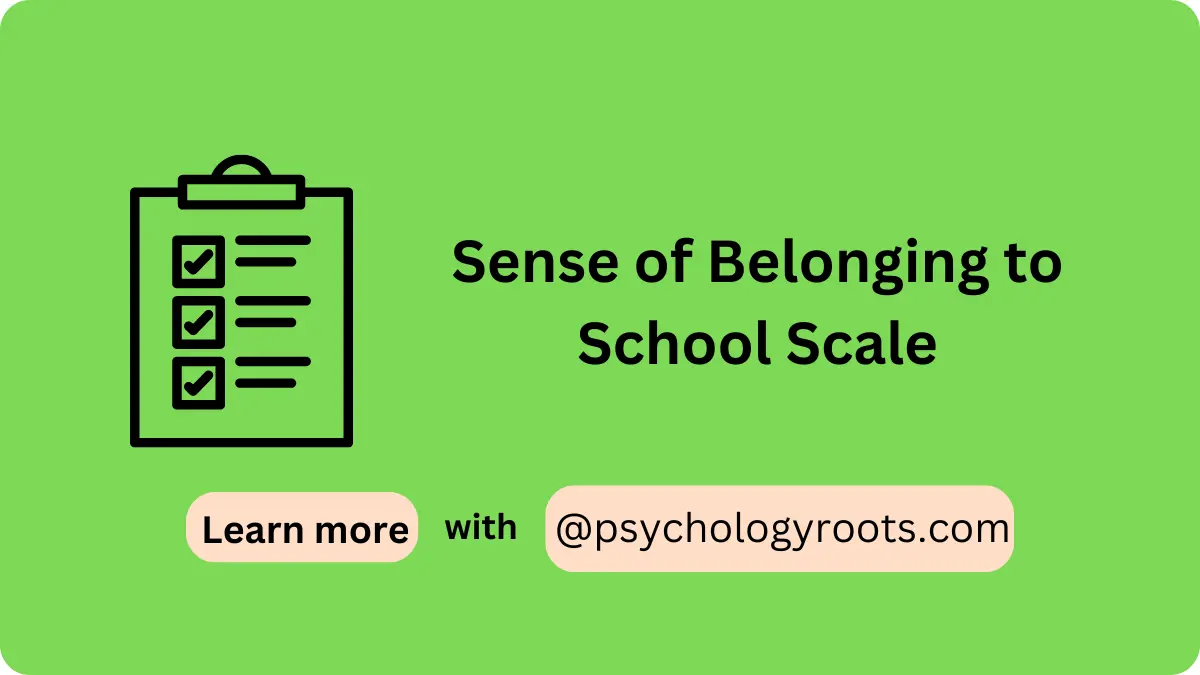Table of Contents
Sense of Belonging to School Scale
Here in this post, we are sharing the “Sense of Belonging to School Scale”. You can read psychometric and Author information. We have thousands of Scales and questionnaires in our collection (See Scales and Questionnaires). You can demand us any scale and questionnaires related to psychology through our community, and we will provide you with a short time. Keep visiting Psychology Roots.
About Sense of Belonging to School Scale
Scale Name
Sense of Belonging to School Scale
Author Details
Ruken AKAR VURAL, Serap YILMAZ ÖZELÇİ, Meltem ÇENGEL and Müfit GÖMLEKSİZ
Translation Availability
Not sure

Background/Description
The Sense of Belonging to School Scale was developed to assess students’ feelings of acceptance, attachment, and identification with their school environment. A strong sense of belonging has been associated with positive academic, emotional, and social outcomes, making this scale valuable for educators and researchers interested in understanding students’ engagement in school settings.
Belonging to school is linked to increased motivation, better academic performance, and reduced absenteeism. It reflects students’ perceptions of being supported, respected, and valued by teachers, peers, and the school community, contributing to their overall well-being and success.
Administration, Scoring and Interpretation
- Target Population: The scale is designed for use with students, particularly those in middle and high school, to evaluate their sense of belonging within the school environment.
- Format: The scale includes 35 items that participants respond to on a 5-point Likert scale, ranging from strongly disagree to strongly agree. The items cover various dimensions of belonging, such as connectedness to peers, school climate, and emotional attachment to the institution.
- Administration: The scale can be self-administered in both research and educational settings. It is particularly useful for identifying students who may feel disconnected from the school environment.
- Scoring: Each item is rated on a 5-point scale, and scores are summed to give an overall sense of belonging score. Higher scores indicate a stronger sense of belonging to the school, while lower scores suggest potential issues with school engagement or attachment.
- Interpretation: Higher scores reflect a greater sense of school connectedness, which is predictive of positive educational and social outcomes. Lower scores may indicate that a student feels isolated or unsupported, signaling the need for interventions.
Reliability and Validity
The Sense of Belonging to School Scale has demonstrated excellent psychometric properties. The scale shows strong internal consistency, with Cronbach’s alpha values ranging between 0.85 to 0.90 across various studies.
- Reliability: The internal consistency and test-retest reliability have been confirmed in different student populations.
- Validity: The scale has high construct validity, correlating with other measures of school engagement, academic performance, and social connectedness.
Available Versions
Multiple-Items
Reference
Akar-Vural, R., Yilmaz-Özelçi, S., Çengel, M., & Gömleksiz, M. (2013). The Development of the” Sense of Belonging to School” Scale. Eurasian Journal of Educational Research, 53, 215-230.
Important Link
Scale File:
Frequently Asked Questions
Q: What does the Sense of Belonging to School Scale measure?
A: It measures students’ feelings of connection, support, and acceptance within their school, including relationships with peers and teachers.
Q: Who can take the Sense of Belonging to School Scale?
A: The scale is suitable for students, especially those in middle and high school.
Q: How can the scale help educators?
A: It can help identify students who may be at risk of disengagement or poor academic performance due to a lack of belonging, guiding potential interventions.
Q: How reliable is the scale?
A: The scale has demonstrated high reliability, with Cronbach’s alpha values indicating consistent results across different populations.
Q: Can the scale be used for research purposes?
A: Yes, the scale is widely used in educational research to explore the relationship between students’ sense of belonging and various academic and social outcomes.
Disclaimer
Please note that Psychology Roots does not have the right to grant permission for the use of any psychological scales or assessments listed on its website. To use any scale or assessment, you must obtain permission directly from the author or translator of the tool. Psychology Roots provides information about various tools and their administration procedures, but it is your responsibility to obtain proper permissions before using any scale or assessment. If you need further information about an author’s contact details, please submit a query to the Psychology Roots team.
Help Us Improve This Article
Have you discovered an inaccuracy? We put out great effort to give accurate and scientifically trustworthy information to our readers. Please notify us if you discover any typographical or grammatical errors.
Make a comment. We acknowledge and appreciate your efforts.
Share With Us
If you have any scale or any material related to psychology kindly share it with us at psychologyroots@gmail.com. We help others on behalf of you.